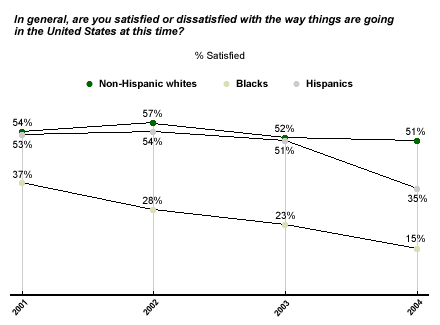Whatever is driving dissatisfaction with the way things are going in the United States is apparently having more of an influence on minorities than it is on whites. Gallup's annual Minority Rights and Relations poll* indicates that black Americans and Hispanic Americans are less satisfied with the way things are going in the United States than they have been in the past few years. Blacks and Hispanics are also less satisfied than non-Hispanic whites. Half as many blacks say they are satisfied than said so three years ago and the decline among Hispanics, although not as dramatic, is also substantial.
A majority of blacks (83%) are dissatisfied, while only 15% are satisfied with the way things are going in the United States at this time; this satisfaction figure is down from 37% in 2001. Approximately a third (35%) of Hispanics are satisfied with the way things are going, dropping from a majority (53%) in 2001. Hispanics' displeasure with the current situation rose from 44% in 2001 to 60% this year.
Among blacks, there was a gradual decrease in satisfaction from 2001 to 2003, while satisfaction among Hispanics stayed relatively unchanged. Slim majorities of Hispanics were satisfied until this year. Satisfaction nose-dived among both groups in 2004.

Minority Dissatisfaction May Be Economic
In comparison with blacks and Hispanics, whites' responses are more divided, much as they were in 2003. Approximately half of whites (51%) are satisfied with the way things are going in the country and 47% are dissatisfied. Division among whites was far less pronounced in 2002 and 2001.
While many issues could be influencing the decline in satisfaction among minorities, the economy is certainly a major one.
Both economics and politics are, in fact, big concerns for 47-year-old Rose Samuels, a multiracial woman from Florida who is dissatisfied with the way things are going in America. Samuels believes that her "taxes were too high" and, as a lifelong Democrat, she is "very dissatisfied with the policies of the Bush administration." She feels that race plays a role in her dissatisfaction. "My husband is black, it's very hard for him to get ahead, "she says.
Even some Americans who are satisfied with the way things are going in the United States are able to empathize with those who are not. Californian Michael Louie, says he is generally satisfied with the way things are going, but agrees that economics may be an area in which people are dissatisfied. He suggests that the "division of money [in the United States] seems to be the luck of the draw."
Other issues can influence satisfaction in the United States, as well. "Personally, I'm satisfied with the way things are going in my own life, as I am blessed," says Trudy Dockery, a 37-year-old black account executive from New Jersey. "But I have some dissatisfaction with the way things are going in the U.S. right now. There's a lot of work to be done in race relations in this country," she says. Dockery acknowledges that some people say blacks have the same chances to progress in society that whites do, but she feels there are profound differences between suburban and inner-city schools. "Suburban schools may have new textbooks and computers, while predominantly inner-city minority schools may still be using textbooks with outdated information. This is a great disadvantage."
*Results are based on telephone interviews with 2,250 national adults, aged 18 and older, conducted June 9-30, 2004, including oversamples of blacks and Hispanics that are weighted to reflect their proportions in the general population. For results based on the total sample of national adults, one can say with 95% confidence that the maximum margin of sampling error is ±5 percentage points.
Results for the sample of 816 non-Hispanic whites, aged 18 and older, are based on telephone interviews conducted June 9-30, 2004. For results based on the total sample, one can say with 95% confidence that the margin of sampling error is ±6 percentage points.
Results for the sample of 801 blacks, aged 18 and older, are based on telephone interviews conducted June 9-30, 2004. For results based on the total sample, one can say with 95% confidence that the margin of sampling error is ±8 percentage points.
Results for the sample of 503 Hispanics, aged 18 and older, are based on telephone interviews, conducted June 9-30, 2004. For results based on the total sample, one can say with 95% confidence that the margin of sampling error is ±8 percentage points. (164 out of the 503 interviews with Hispanics were conducted in Spanish.)
